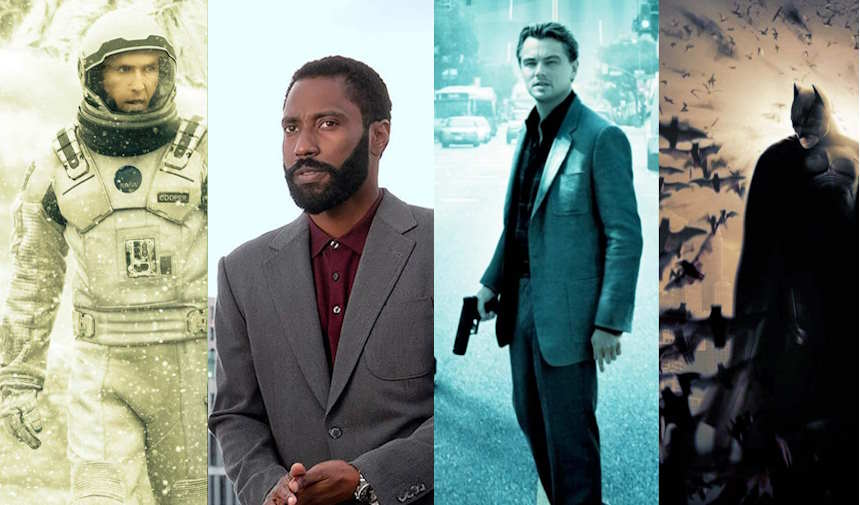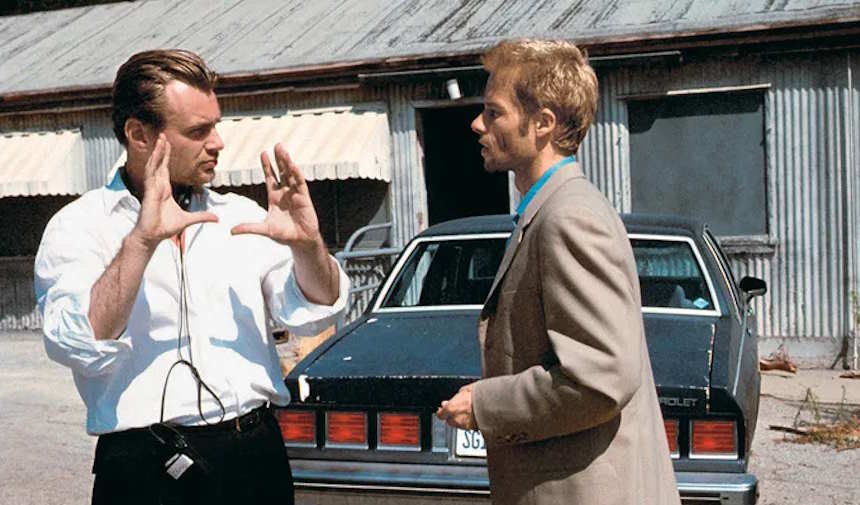Christopher Nolan Movies in Chronological Order
If you want to watch Christopher Nolan movies in chronological order, I will give you a perfect list of Christopher Nolan’s filmography. This will enhance your viewing experience and provide a deeper understanding of his evolving style and storytelling techniques. Nolan’s movies are known for their intricate plots, innovative cinematography, and gripping narratives. Watching them in the order they were released will allow you to appreciate the progression of his craft.
Starting with “Following” (1998), you’ll see the early signs of Nolan’s penchant for non-linear storytelling. Next on the list is “Memento” (2000), a film that solidified his reputation with its unique backward narrative structure. Moving forward, we have “Insomnia” (2002), where Nolan delves into psychological thriller territory.”The Prestige” (2006) showcases his ability to blend mystery with science fiction elements.
Following this is “Batman Begins” (2005) which redefined superhero films, setting a new standard for character depth and realism in comic book adaptations. As you continue, be sure not to miss “The Dark Knight” (2008) and its profound exploration of chaos versus order, followed by “Inception” (2010), a mind-bending journey through dreams within dreams that challenges perceptions of reality.
Next comes “The Dark Knight Rises” (2012), providing an epic conclusion to his Batman trilogy. Afterward, watch “Interstellar” (2014) where Nolan ambitiously tackles space travel and human emotion in an unforgettable sci-fi masterpiece.”Dunkirk” (2017) offers a powerful recounting of WWII from multiple perspectives through minimal dialogue but maximum impact visuals.
Christopher Nolan Movies in Chronological Order

Christopher Nolan’s filmography is a testament to his genius as a filmmaker, presenting a compelling journey through the world of cinema that every movie enthusiast should explore in chronological order. Starting with his debut feature, “Following” (1998), Nolan showcased his unique storytelling ability and stylistic flair. This was followed by the critically acclaimed “Memento” (2000), a groundbreaking film known for its innovative narrative structure.
Nolan continued to captivate audiences with movies like “Insomnia” (2002) and then redefined the superhero genre with “Batman Begins” (2005). His visionary approach reached new heights with “The Prestige” (2006), a mesmerizing tale of rivalry and illusion. The monumental success of “The Dark Knight” (2008) further cemented his status as an influential director, setting new standards for cinematic excellence. In 2010, Nolan explored the depths of human consciousness with “Inception,” a mind-bending thriller that left audiences in awe.
He then concluded his Batman trilogy with the epic finale, “The Dark Knight Rises” (2012). His subsequent films, including the space odyssey “Interstellar” (2014), the intense war drama “Dunkirk” (2017), and the enigmatic spy thriller “Tenet” (2020), each added layers of complexity and depth to his already impressive body of work.
Tracing Nolan’s timeline through these influential movies reveals not just an evolution in filmmaking techniques but also an enduring impact on contemporary cinema. By exploring this chronological order list, viewers can appreciate how each film contributes to Nolan’s overarching vision and continues to influence both audiences and filmmakers alike.
Following (1998)
This noir thriller, Nolan’s directorial debut, showcases his early mastery of complex storytelling and nonlinear narratives that would become hallmarks of his later works.
“Following” tells the story of a young writer who becomes entangled in the life of a charismatic thief. Shot on a shoestring budget, this film is a testament to Nolan’s ingenuity and vision. The intricate plot weaves through time with precision, offering viewers an early glimpse into the mind of a director who would go on to create some of cinema’s most thought-provoking films.
For fans and newcomers alike, watching “Following” is essential for understanding the evolution of Nolan’s cinematic style. It not only lays the groundwork for his future masterpieces but also stands strong as an independent work that challenges conventional storytelling techniques. If you’re looking to experience Christopher Nolan movies in chronological order, starting with “Following” will undoubtedly enrich your appreciation for his unique approach to filmmaking.
Memento (2000)

“Memento” tells the story of Leonard Shelby, a man suffering from short-term memory loss, who is on a quest to find his wife’s murderer. What makes this film unique is its non-linear storytelling, which mirrors Leonard’s fragmented memory. By presenting scenes in reverse order, Nolan immerses the audience directly into Leonard’s disoriented state of mind, making each revelation and twist more impactful.
Christopher Nolan’s innovative approach in “Memento” laid the foundation for his future works, showcasing his ability to blend complex narratives with deep emotional undertones. If you’re exploring Nolan’s filmography chronologically, starting with “Memento” sets the stage for understanding his evolution as a filmmaker and appreciating how he continually pushes the boundaries of storytelling.
In essence, “Memento” isn’t just another entry on Nolan’s impressive resume; it’s a pivotal piece that highlights his genius and cements his reputation as one of modern cinema’s most influential directors. Watching it will not only entertain you but also give you insight into the intricate craftsmanship that defines Christopher Nolan’s illustrious career.
Insomnia (2002)
“Insomnia” (2002) stands as a pivotal film in Christopher Nolan’s illustrious career, marking his first foray into mainstream Hollywood. When examining Christopher Nolan movies in chronological order, “Insomnia” is often highlighted for its masterful storytelling and intense psychological depth. This gripping psychological thriller showcases the director’s evolving prowess in crafting complex narratives that delve into the human psyche.
Starring Al Pacino, Robin Williams, and Hilary Swank, “Insomnia” weaves a tale of moral ambiguity and relentless tension set against the haunting backdrop of an Alaskan town bathed in perpetual daylight. The film follows two Los Angeles homicide detectives dispatched to investigate the murder of a teenage girl. As they grapple with their own sleeplessness and guilt, viewers are drawn into a labyrinthine plot that challenges perceptions of right and wrong.
What makes “Insomnia” particularly compelling is how it lays the groundwork for themes Nolan would continue to explore in his later works—identity, guilt, and moral complexity. For fans tracing Christopher Nolan movies in chronological order, this film is essential viewing to understand his artistic evolution. It demonstrates his ability to blend compelling characters with intricate plots seamlessly.
In conclusion, “Insomnia” (2002) is not just another entry in Nolan’s filmography; it is a testament to his burgeoning talent as a filmmaker capable of delivering both suspenseful entertainment and profound thematic content. If you’re charting Christopher Nolan’s cinematic journey chronologically, missing out on “Insomnia” would be akin to skipping an important chapter in an engrossing novel—one that enriches your appreciation for the narrative skill he brings to every project.
Batman Begins (2005)
Christopher Nolan’s “Batman Begins” (2005) is a pivotal film that redefined the superhero genre and set a new standard for storytelling in cinema. As the first installment in Nolan’s critically acclaimed Dark Knight Trilogy, it laid the groundwork for an epic narrative arc that would captivate audiences worldwide. When exploring Christopher Nolan movies in chronological order, “Batman Begins” stands out as a masterclass in character development, thematic depth, and cinematic innovation.
Nolan’s meticulous attention to detail and his ability to weave complex narratives are evident throughout the film. He delves into Bruce Wayne’s psyche, exploring his fears, motivations, and transformation into Batman with unparalleled depth. This approach not only humanizes the iconic superhero but also makes his journey relatable and compelling.
The film’s success is further amplified by its stellar cast, including Christian Bale as Bruce Wayne/Batman, Michael Caine as Alfred Pennyworth, and Liam Neeson as Ra’s al Ghul. Their performances bring authenticity and gravitas to the story, making it more than just another superhero flick.
In conclusion, “Batman Begins” is not just a cornerstone of Christopher Nolan’s illustrious career but also a landmark in modern cinema. It serves as an essential starting point for anyone looking to appreciate Nolan’s work in chronological order and understand his impact on filmmaking.
The Prestige (2006)
“The Prestige” (2006), nestled between the groundbreaking “Batman Begins” (2005) and the mind-bending “Inception” (2010), showcases Nolan’s unparalleled ability to weave intricate narratives that captivate audiences.
“The Prestige” is not just a movie; it’s an experience. It delves into the competitive world of magicians in the late 19th century, exploring themes of obsession, sacrifice, and the quest for greatness. With stellar performances by Hugh Jackman and Christian Bale, this film keeps you on the edge of your seat from start to finish.
Watching “The Prestige” is essential for anyone looking to understand Nolan’s evolution as a filmmaker. The meticulous attention to detail, complex characters, and unexpected twists are hallmarks that define his work. By watching Christopher Nolan movies in chronological order, starting with his earlier work like “Memento” (2000) and leading up to “The Prestige,” you gain a deeper appreciation for his storytelling genius.
So if you’re planning a Christopher Nolan marathon or simply want to dive into one of his most compelling films, make sure “The Prestige” is high on your list. It’s a cinematic gem that exemplifies why Nolan is considered one of the greatest directors of our time.
The Dark Knight (2008)
“The Dark Knight,” released in 2008, is a cinematic masterpiece that stands as a cornerstone in Christopher Nolan’s illustrious career. When exploring Christopher Nolan movies in chronological order, it becomes evident that “The Dark Knight” is not merely another film but a pivotal moment that redefined the superhero genre.
Nolan’s meticulous attention to detail and his ability to weave complex narratives are on full display in this movie. The film’s compelling storyline, combined with Heath Ledger’s unforgettable performance as the Joker, elevates it beyond traditional superhero fare. It’s not just an action-packed adventure; it’s an exploration of chaos, morality, and the human psyche.
For fans and newcomers alike, watching Christopher Nolan movies in chronological order offers a unique perspective on his growth as a filmmaker. “The Dark Knight” serves as both a critical and commercial success within his oeuvre, showcasing his knack for blending thought-provoking themes with blockbuster appeal.
In conclusion, “The Dark Knight” isn’t just essential viewing for fans of Nolan or superhero films; it’s essential viewing for anyone who appreciates masterful storytelling and groundbreaking cinema.
Inception (2010)
Christopher Nolan’s “Inception” (2010) stands as a masterpiece in modern cinema, seamlessly blending mind-bending concepts with breathtaking visual storytelling. If you’re a fan of Nolan’s work, watching his movies in chronological order is an enlightening experience that showcases his evolution as a director and storyteller.
“Inception” is often regarded as one of Nolan’s finest films, sitting comfortably among other iconic works like “Memento,” “The Dark Knight,” and “Interstellar.” The film delves into the intricate world of dreams within dreams, pushing the boundaries of what we perceive as reality. With its complex narrative structure and innovative special effects, it epitomizes Nolan’s unique ability to craft intellectually stimulating yet highly entertaining films.
For those who appreciate Christopher Nolan movies in chronological order, “Inception” serves as a pivotal point in his career. It encapsulates his growth from the early days of independent filmmaking to becoming a visionary director capable of handling big-budget productions without compromising on depth or originality.
So if you haven’t already, immerse yourself in Nolan’s cinematic universe. Start from the beginning and watch how each film builds upon the last, leading up to the groundbreaking spectacle that is “Inception.” You’ll gain not only a deeper appreciation for this particular film but also for the genius behind it.
The Dark Knight Rises (2012)
When discussing Christopher Nolan movies in chronological order, “The Dark Knight Rises” (2012) holds a monumental place. This film is not just the conclusion of Nolan’s critically acclaimed Batman trilogy; it’s a cinematic masterpiece that redefines the superhero genre.
One cannot overlook how “The Dark Knight Rises” encapsulates the essence of Nolan’s storytelling brilliance. The narrative is both compelling and complex, weaving together themes of redemption, sacrifice, and resilience. Christian Bale delivers a powerful performance as Bruce Wayne/Batman, while Tom Hardy’s Bane adds an unforgettable layer of menace and gravitas.
Nolan’s meticulous attention to detail shines through in every frame, from the breathtaking action sequences to the emotionally charged dialogues. The film’s score by Hans Zimmer further elevates its epic scope, creating an immersive experience that lingers long after the credits roll.
In essence, “The Dark Knight Rises” is not merely a movie but a testament to Christopher Nolan’s unparalleled ability to craft stories that resonate on multiple levels. It stands as a pivotal chapter in his illustrious career and remains an essential watch for any cinema enthusiast looking to explore Nolan’s work in chronological order.
Interstellar (2014)
Interstellar (2014) stands out as one of Christopher Nolan’s most ambitious and thought-provoking films, a masterpiece that solidifies his reputation in the annals of cinematic history. When we examine Christopher Nolan movies in chronological order, Interstellar emerges as a pivotal point where science fiction meets profound emotional depth.
Nolan’s meticulous attention to detail and his ability to intertwine complex scientific concepts with human emotions make Interstellar a remarkable experience. The film explores themes of love, sacrifice, and the survival of the human race against the backdrop of space exploration. Its stunning visual effects, coupled with Hans Zimmer’s haunting score, create an immersive atmosphere that lingers long after the credits roll.
For fans and newcomers alike, watching Christopher Nolan movies in chronological order offers a unique perspective on his evolving directorial style. From Memento’s mind-bending narrative to Inception’s dreamscapes, leading up to Interstellar’s cosmic journey, each film builds upon the last in terms of complexity and innovation.
In conclusion, Interstellar is not just another entry in Nolan’s filmography; it is a testament to his visionary storytelling. It challenges viewers to think beyond conventional boundaries while delivering an emotionally resonant story that resonates on multiple levels. If you haven’t yet experienced this cinematic gem or are considering revisiting it within the context of Christopher Nolan movies in chronological order, now is undoubtedly the time.
Dunkirk (2017)
“Dunkirk” (2017), set during World War II, masterfully intertwines three distinct timelines—land, sea, and air—creating a gripping narrative that keeps audiences on the edge of their seats.
Nolan’s direction in “Dunkirk” is nothing short of genius. He uses minimal dialogue and relies heavily on visual storytelling and Hans Zimmer’s haunting score to convey the intense emotions and high stakes of the evacuation. The film’s non-linear structure is not just a stylistic choice; it serves to highlight the chaos and urgency faced by soldiers and civilians alike.
In “Dunkirk,” Nolan proves once again why he is one of the most innovative directors of our time. By focusing on individual acts of heroism within a larger historical context, he offers a fresh perspective on war that is both intimate and epic. If you’re exploring Christopher Nolan movies in chronological order, “Dunkirk” is an essential watch that showcases his unparalleled ability to blend complex narratives with powerful human stories.
Tenet(2020)
Christopher Nolan’s “Tenet” (2020) is a cinematic masterpiece that demands your attention. As the latest addition to Nolan’s illustrious filmography, it stands as a testament to his unparalleled ability to blend mind-bending concepts with gripping storytelling. If you’ve been following Christopher Nolan movies in chronological order, “Tenet” is an essential watch that ties together many of the thematic and stylistic elements he’s been perfecting over the years.
From the non-linear narrative structure reminiscent of “Memento,” to the intricate action sequences that echo “Inception,” “Tenet” encapsulates everything we love about Nolan’s work. It challenges our perception of time and reality in ways we’ve never seen before, making it not just a film, but an experience. For anyone invested in understanding the evolution of Christopher Nolan as a filmmaker, “Tenet” is not just another movie; it’s a pivotal chapter in his career.
Don’t miss out on this extraordinary film that continues to push the boundaries of what cinema can achieve. Watch “Tenet,” and witness firsthand why Christopher Nolan remains one of the most innovative directors of our time.


